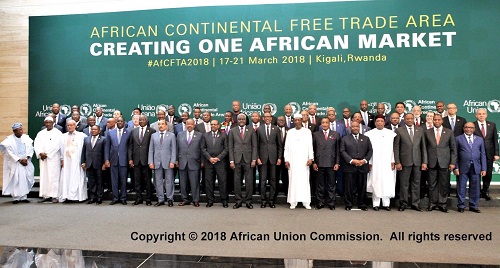Members of the Committee on Foreign Affairs of Parliament paid a visit to the AfCFTA Secretariat last week and were briefed by the Minister of Trade and Industry, Alan John Kojo Kyerematen, who informed the delegation that AfCFTA will commence operation in January 2021.
Tentatively, AfCFTA was scheduled to be officially commissioned on 31st March 2020 for the commencement of trading among member-states under the agreement on 1st July 2020. However, the COVID-19 pandemic which necessitated border closures changed all that.
It should be well known by now that Ghana hosts the Secretariat of AfCFTA after bidding for the offer to host the Secretariat – which makes us all proud and enhances the country’s Pan-Africanist tradition.
The implementation of AfCFTA requires member-countries to liberalise at least 97 percent of their tariff lines and 90 percent of imports. This continental free-trade area will be the world’s largest economic free trade zone and is expected to increase intra-African trade from the current 12 percent of total trade by African countries to 52 percent by 2023.
The World Bank’s Chief Economist for Africa, Albert Zeufack believes: “The African Continental Free Trade Area has the potential to increase employment opportunities and incomes, helping to expand opportunities for all Africans”.
In fact, a new World Bank report has found that AfCFTA represents a major opportunity for countries to boost growth, reduce poverty, and broaden economic inclusion.
“If implemented fully, the trade pact could boost regional income by 7% or US$450billion; speed up wage growth for women; and lift 30 million people out of extreme poverty by 2035.”
The report suggests that achieving these gains will be particularly important given the economic damage caused by the COVID-19 (coronavirus) pandemic, which is expected to cause up to US$79billion in output losses for Africa in 2020.
Successful implementation of AfCFTA would help cushion the negative effects of COVID-19 on economic growth by supporting regional trade and value chains through the reduction of trade costs, the report further notes.
Indeed, AfCFTA could help African countries increase their resiliency in the face of future economic shocks. According to the report, the agreement will reshape markets and economies across the region, leading to the creation of new industries and expansion of key sectors.
Governments need to prepare their workforces to take advantage of new opportunities with new policies designed to reduce the costs of job-switching.










